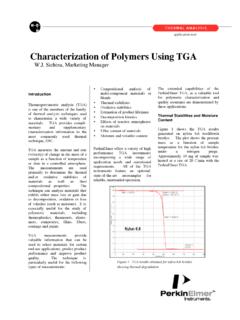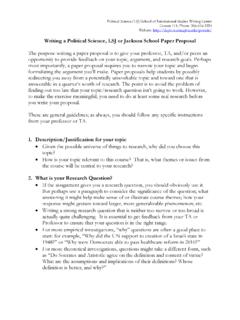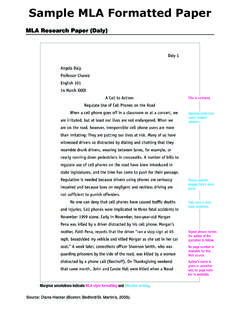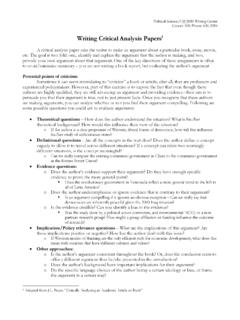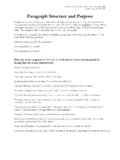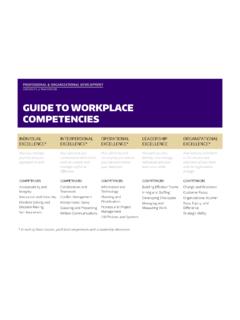Transcription of Vision & Sensory Integration - University of Washington
1 Vision & Sensory Integration Connecting Vision & Body Bryan Smith , FACBO, FCOVD. city Workshop by Richard Lavoie How Hard Can This Be? By Richard Lavoie In the author's workshops, participants wind up frustrated, angry, and in tears and finally understand what having a learning disability means My awakening to the challenges faced by children with learning disabilities occurred nearly 30. years ago, on an autumn morning in 1972. At the time, I was already involved in the field as a recently certified teacher at a small school in Massachusetts for kids with learning disabilities. I still had much to learn. Craig was a 13-year-old student with severe dyslexia and language deficits. He was a very motivated and likable kid who was exceptionally eager to please, and we had a great relationship. I was assigned as his tutor, and in that role it was my job to teach him the language arts .
2 No small task. At the end of class one morning, I asked him to write a 150-word composition for the next day. Considering his difficulties with written language, the topic I selected was one of his favourites. "Write about your dog," I suggested. Craig submitted his essay to me the next morning, and that evening I began correcting the errors. Armed with my red pencil, I highlighted and corrected every misspelling, punctuation error, and capitalization mistake. I commented on the inconsistent slant of his handwriting and his failure to adhere to the right-hand margin. When I arrived at my classroom the next morning, I was surprised to find Craig waiting for me. "Did you read my composition, Mr. Lavoie?" he asked eagerly. "Did you like it?". "Sure did," I responded. "I was glad to see that you used some of our new vocabulary words. But, Craig, we need to talk about some of the mistakes you made.
3 ". I placed the composition on the desk and began reviewing the corrections. As I looked over at Craig, I could see tears forming in his eyes. I had seen Craig in countless tough spots, but I had never seen him cry. I stopped and asked what was wrong. "I know that you're doing your job, Mr. Lavoie," he said. "I. know that these are real mistakes on this paper. But I stayed in my dorm for an hour after study hall to proofread my story. I reread it four times. And look at all the mistakes that I missed.". I gently placed my hand on his shoulder, looked him in the eyes, and proceeded to say the dumbest thing that I have ever said to a student. "It's okay, Craig," I said softly. "I know how you feel.". Craig stood up and said with uncharacteristic anger and frustration "The heck you do! Tell me that you'll help me, tell me that you feel bad for me, but don't tell me that you know how I feel!
4 You have no idea how I feel!". As he stormed from the room, I came to recognize for the first time the great irony of the teaching profession: Those of us who teach school usually did well in school ourselves and enjoyed the experience why else would we return to the classroom to make our living? Therefore, the kid whom we can best understand to whom we can relate most is the one who does well in school and enjoys being there. The school newspaper editor. The class treasurer. The soccer captain. The honour student. Conversely, the kids whom we understand the least are the kids who need us the most. The struggler, the special-education student, the failure .. Craig. It took several weeks to repair the damage I caused to Craig's self-esteem and our relationship. I. learned much from that incident, and made a commitment to do all that I could to increase the sensitivity of teachers.
5 Before we can fully understand the feelings of another person, perhaps we must first see the world as he or she does. Frustration, Anxiety, and Tension The city workshop and video are my contributions to the important process of understanding learning disabilities. stands for Frustration, Anxiety, and Tension and that's exactly what the participant's experience. This workshop and video provide teachers, parents, caregivers, and siblings with the opportunity actually to experience the emotions and stresses that children with learning disabilities face daily. By using simulations and contrived activities as models (for example, telling a story without using any words that contain the letter N), the participants temporarily experience the frustration, anxiety, and tension that is the lifestyle of students with special needs. For the first time in years, these parents and educators are asked to sit on the other side of the teacher's desk.
6 They are required to recite aloud and complete timed spelling and writing activities under great pressure. I play the role of an unforgiving and uninformed teacher. I yell. I scold. I ridicule. I interrupt. I embarrass. ("Try harder!" "Pay attention!" "Are you trying to be funny?" "Why can't you do this? Everyone else can. ) I recall the results with myriad emotions: The elementary-school principal who stormed out of the workshop .. only to be found crying in his office about his own long-undiagnosed learning disorder;. The divorced dad who left the workshop and drove directly to the airport to fly to his son and hug him for the first time in 10 years .. because he finally understood the boy;. The tenured teacher who approached me to say, "I have been teaching school for 22. years .. and tomorrow I am starting all over again!";. The teacher of English who mailed me all of her red pencils.
7 With a note promising she would never use another one again. The workshop gives teachers the opportunity to "walk a mile" in the shoes of the students who invariably cause complications and disruptions in the classroom. By viewing the world through the eyes of the child, teachers gather insights into a child's troubling behaviours. As I often remind my audiences, "The pain that a troubled child causes is never greater than the pain that he feels.". Save Now, Pay Later A school superintendent phoned me recently for counsel regarding a problem he was facing. Because of a budget cut, he had elected to eliminate the system's Early Identification Project, which pinpointed the district's "at risk" students at age five and provided readiness skills prior to kindergarten entry. What did I think? Upon hearing this, I was immediately mindful of a person I had met in my travels.
8 Dan, a college student who had not been diagnosed with a learning disability until he was 20 years old, told me of an incident that had occurred when he was in first grade. Unable to master the reading process early on in the school year, he feared the reactions of his teachers and parents to his inability to "keep up." Dan soon came to realize that one of his classmates was also a non reader, but that child was seldom criticized by the teachers or ridiculed by the other kids. The child was deaf. Because of this disability, his reading problems were deemed understandable. Dan decided that the solution to his dilemma was to convince everyone that he, too, was deaf. For two months, he ignored loud noises, failed to respond when teachers called his name, and, at home, continually set his television at the highest volume possible. When his concerned parents took him to audiologists, he purposely failed the hearing evaluations.
9 The pressure to read as he put it, "to make the books talk" lessened significantly. By the spring, Dan's father told him that the doctors were puzzled by his inexplicable hearing loss and had scheduled exploratory ear surgery and the removal of his adenoids. Dan actually went through with a surgical procedure that only he knew he did not need. An Early Identification Program would have diagnosed Dan and saved him from this trauma. The decisions that we make in our offices, classrooms, and conference rooms do have an impact on the children we have pledged to serve. A reporter once asked me, "If you could teach America's parents and teachers one single truth, what would it be?" "Simple," I responded. "We need to understand that kids go to school for a living. That's their job." What if you hated your job? What if your days were filled with conflict and you were misunderstood by your colleagues and superiors?
10 What if you failed at nearly every task you were assigned? How would you react? This is the daily experience of a child with a learning disability. The next time a student with special needs disrupts your class, forgets his or her homework, or spills the milk, try to remember the sage observation of a 12-year-old who sadly told a teacher, "It's like my mind is a television set, but someone else is working the remote control. Sometimes my life just gets all scribbly.". They need us to be at our best. They can't function, grow, or progress with anything less. Signs of a Learning Disability How do you spot a child who may have a learning disability? Although all children with learning disabilities are different, each shows at least two or three warning signs. If these signs are chronic or occur in clusters, they may indicate a problem. The checklist below, provided by the National Centre for Learning Disabilities, in New York city , includes many common signs of a learning disability.
